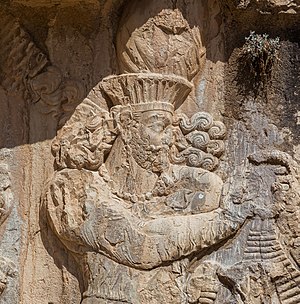
Back نرسي Arabic نرسى ARZ نرسه AZB Нарсе Bulgarian Narsès de Pèrsia Catalan Narsé Czech Narseh German Nerseh DIQ Ναρσής Greek Narsés de Armenia Spanish
| Narseh 𐭭𐭥𐭮𐭧𐭩 | |
|---|---|
| King of Kings of Iran and non-Iran[a] | |
 Rock relief of Narseh in Naqsh-e Rostam | |
| King of Armenia | |
| Reign | 271 – 293 |
| Predecessor | Hormizd I |
| Shahanshah of the Sasanian Empire | |
| Reign | 293 – 303 |
| Predecessor | Bahram III |
| Successor | Hormizd II |
| Born | Between 228–233 |
| Died | 303 (aged 70–75) |
| Spouse | Shapurdukhtak |
| Issue | Hormizd II Hormizddukhtak |
| House | House of Sasan |
| Father | Shapur I |
| Religion | Zoroastrianism |
Narseh (also spelled Narses or Narseus; Middle Persian: 𐭭𐭥𐭮𐭧𐭩) was the seventh Sasanian King of Kings of Iran from 293 to 303.
The youngest son of Shapur I (r. 240–270), Narseh served as the governor of Sakastan, Hind and Turan under his father. Shapur I was eventually succeeded by his son Hormizd I (r. 270–271), who died after a reign of one year. Shapur I's eldest son Bahram I, who had never been considered as a candidate for succession to the throne by his father, ascended the throne with the aid of the powerful Zoroastrian priest Kartir. He then made a settlement with Narseh to give up his entitlement to the throne in return for the governorship of the important frontier province of Armenia, which was a persistent cause for war between the Roman and Sasanian Empires. Narseh held the title of Vazurg Šāh Arminān ("Great King of Armenia"), which was used by the heir to the throne in the early Sasanian times. Nevertheless, Narseh most likely still viewed Bahram I as a usurper.
The succession of Bahram I's son, Bahram II (r. 274–293) seemingly occurred without any issues. After Bahram II's death in 293, his son Bahram III was unwillingly crowned by a nobleman named Wahnam. The rest of the nobility did not support Bahram III's kingship, and asked Narseh to rule instead. Ultimately, Bahram III abdicated as shah, while Wahnam was executed. Narseh was the first Sasanian shah to not ascend the throne as a crown prince. The circumstances of his rise to power are detailed in the Paikuli inscription, which he made as his own Res Gestae Divi Augusti and to legitimize his rule.[1]
Three years after Narseh's accession, war erupted between the Sasanians and Romans once again. In 296 or 297, Narseh's forces inflicted a defeat on the forces of Galerius at the Battle of Carrhae. The following year, however, Narseh suffered a major defeat at Satala; his wives, children, and many Iranian nobles were taken as prisoners of war. Due to this ignominious defeat, Narseh was forced to accept a peace treaty prescribed by the Romans, ceding them several areas at the Sasanian-Roman border.
Narseh is notable for returning to the religious tolerance policy of his father.[2]
Cite error: There are <ref group=lower-alpha> tags or {{efn}} templates on this page, but the references will not show without a {{reflist|group=lower-alpha}} template or {{notelist}} template (see the help page).
- ^ Weber 2012, p. 154.
- ^ Shahbazi 2005.